深圳中考英语总复习 主 要 句 式
- 格式:doc
- 大小:52.00 KB
- 文档页数:8
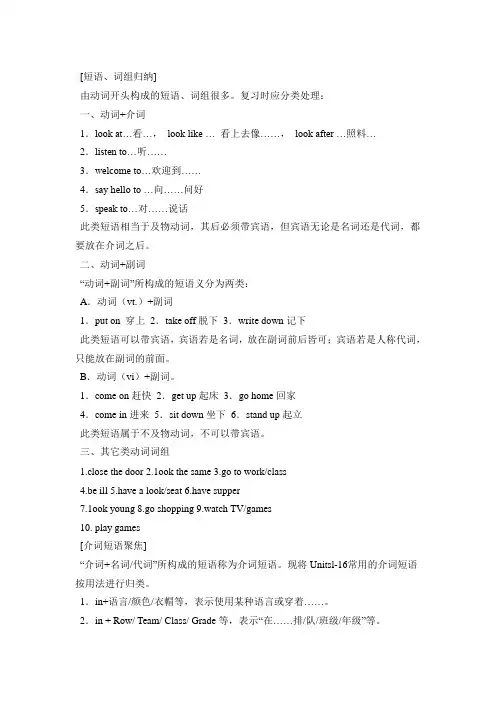
[短语、词组归纳]由动词开头构成的短语、词组很多。
复习时应分类处理:一、动词+介词1.look at…看…,look like … 看上去像……,look after …照料…2.listen to…听……3.welcome to…欢迎到……4.say hello to …向……问好5.speak to…对……说话此类短语相当于及物动词,其后必须带宾语,但宾语无论是名词还是代词,都要放在介词之后。
二、动词+副词“动词+副词”所构成的短语义分为两类:A.动词(vt.)+副词1.put on 穿上2.take off脱下3.write down记下此类短语可以带宾语,宾语若是名词,放在副词前后皆可;宾语若是人称代词,只能放在副词的前面。
B.动词(vi)+副词。
1.come on赶快2.get up起床3.go home回家4.come in进来5.sit down坐下6.stand up起立此类短语属于不及物动词,不可以带宾语。
三、其它类动词词组1.close the door2.1ook the same3.go to work/class4.be ill5.have a look/seat6.have supper7.1ook young 8.go shopping 9.watch TV/games10. play games[介词短语聚焦]“介词+名词/代词”所构成的短语称为介词短语。
现将Unitsl-16常用的介词短语按用法进行归类。
1.in+语言/颜色/衣帽等,表示使用某种语言或穿着……。
2.in + Row/ Team/ Class/ Grade等,表示“在……排/队/班级/年级”等。
3.in the morning/ afternoon/ evening/ 表示“在上午/下午/傍晚”等一段时间。
4.in the desk/ pencil-box/bedroom 等表示“在书桌/铅笔盒/卧室里”。
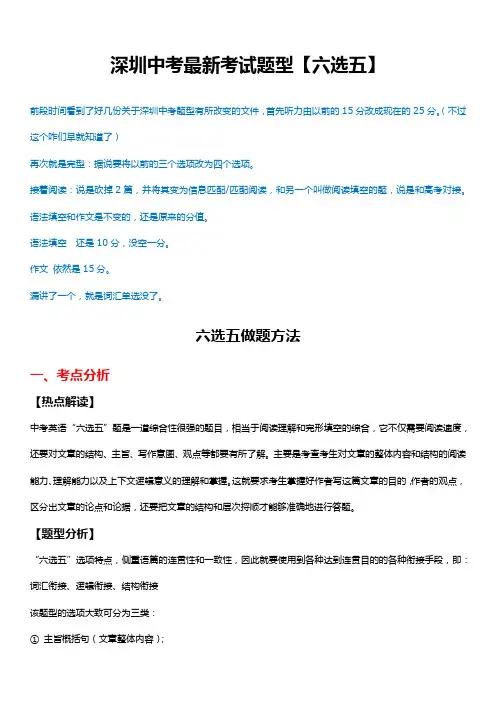
深圳中考最新考试题型【六选五】前段时间看到了好几份关于深圳中考题型有所改变的文件,首先听力由以前的15分改成现在的25分。
(不过这个咋们早就知道了)再次就是完型:据说要将以前的三个选项改为四个选项。
接着阅读:说是砍掉2篇,并将其变为信息匹配/匹配阅读,和另一个叫做阅读填空的题,说是和高考对接。
语法填空和作文是不变的,还是原来的分值。
语法填空还是10分,没空一分。
作文依然是15分。
漏讲了一个,就是词汇单选没了。
六选五做题方法一、考点分析【热点解读】中考英语“六选五”题是一道综合性很强的题目,相当于阅读理解和完形填空的综合,它不仅需要阅读速度,还要对文章的结构、主旨、写作意图、观点等都要有所了解。
主要是考查考生对文章的整体内容和结构的阅读能力、理解能力以及上下文逻辑意义的理解和掌握。
这就要求考生掌握好作者写这篇文章的目的,作者的观点,区分出文章的论点和论据,还要把文章的结构和层次捋顺才能够准确地进行答题。
【题型分析】“六选五”选项特点,侧重语篇的连贯性和一致性,因此就要使用到各种达到连贯目的的各种衔接手段,即:词汇衔接、逻辑衔接、结构衔接该题型的选项大致可分为三类:①主旨概括句(文章整体内容);②过渡性句子(文章结构);③注释性句子(上下文逻辑意义)。
那么,另外一个多余的干扰项就可以通过这三个特点来排除。
例如:主旨概括句要么过于宽泛要么以偏概全或偏离主题,过渡性句子不能反映文章的行文结构,注释性句子与上文脱节等。
【解题技巧】1.先看选项六选五的答案选项较少,并且给出的都是句子,只看选项可以从以下几点着手:①看句子是否完整;②看句子后面的标点符号。
这样可以初步判断该句在文章中的位置。
③有时可以通过选项,找出跟其他选项表达完全不同意思的句子,这样的话我们就可以直接将该选项排除。
2.注意空前空后由于六选五空出的是整个句子,而这些句子与句子之间,必然有一种联系,因此我们可以通过选项中某个名词或动词跟空前或空后的一致性或者相关性来确定这两个句子之间有一种关联性,从而选择正确的答案。
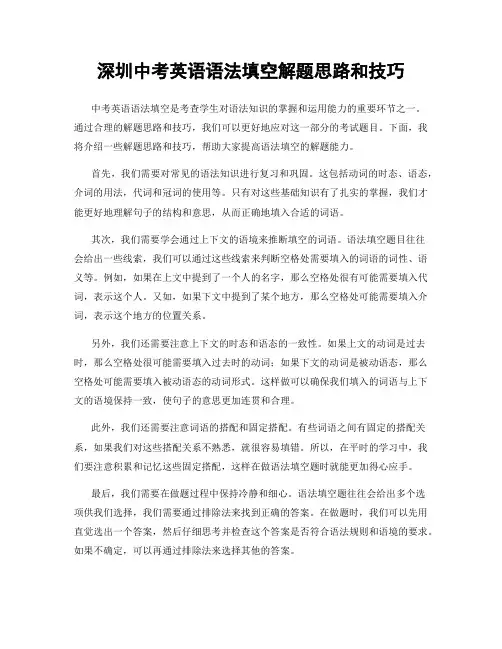
深圳中考英语语法填空解题思路和技巧中考英语语法填空是考查学生对语法知识的掌握和运用能力的重要环节之一。
通过合理的解题思路和技巧,我们可以更好地应对这一部分的考试题目。
下面,我将介绍一些解题思路和技巧,帮助大家提高语法填空的解题能力。
首先,我们需要对常见的语法知识进行复习和巩固。
这包括动词的时态、语态,介词的用法,代词和冠词的使用等。
只有对这些基础知识有了扎实的掌握,我们才能更好地理解句子的结构和意思,从而正确地填入合适的词语。
其次,我们需要学会通过上下文的语境来推断填空的词语。
语法填空题目往往会给出一些线索,我们可以通过这些线索来判断空格处需要填入的词语的词性、语义等。
例如,如果在上文中提到了一个人的名字,那么空格处很有可能需要填入代词,表示这个人。
又如,如果下文中提到了某个地方,那么空格处可能需要填入介词,表示这个地方的位置关系。
另外,我们还需要注意上下文的时态和语态的一致性。
如果上文的动词是过去时,那么空格处很可能需要填入过去时的动词;如果下文的动词是被动语态,那么空格处可能需要填入被动语态的动词形式。
这样做可以确保我们填入的词语与上下文的语境保持一致,使句子的意思更加连贯和合理。
此外,我们还需要注意词语的搭配和固定搭配。
有些词语之间有固定的搭配关系,如果我们对这些搭配关系不熟悉,就很容易填错。
所以,在平时的学习中,我们要注意积累和记忆这些固定搭配,这样在做语法填空题时就能更加得心应手。
最后,我们需要在做题过程中保持冷静和细心。
语法填空题往往会给出多个选项供我们选择,我们需要通过排除法来找到正确的答案。
在做题时,我们可以先用直觉选出一个答案,然后仔细思考并检查这个答案是否符合语法规则和语境的要求。
如果不确定,可以再通过排除法来选择其他的答案。
总结一下,解答深圳中考英语语法填空题需要有扎实的语法知识基础,善于通过上下文的语境推断填空词语,注意上下文的时态和语态的一致性,熟悉词语的搭配和固定搭配,保持冷静和细心。
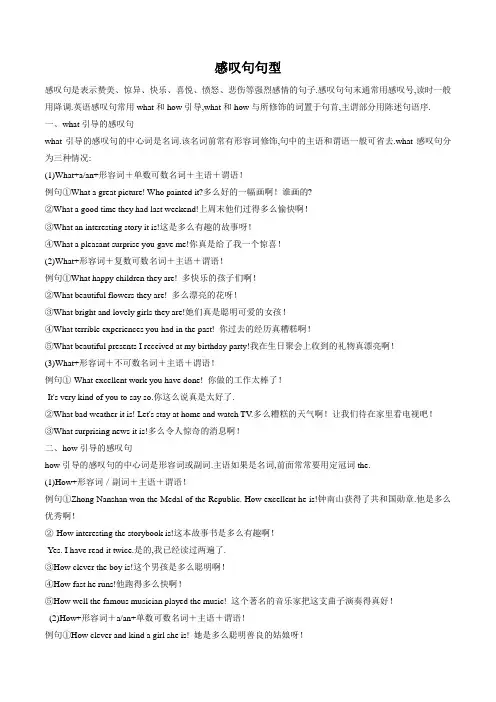
感叹句句型感叹句是表示赞美、惊异、快乐、喜悦、愤怒、悲伤等强烈感情的句子.感叹句句末通常用感叹号,读时一般用降调.英语感叹句常用what和how引导,what和how与所修饰的词置于句首,主谓部分用陈述句语序. 一、what引导的感叹句what引导的感叹句的中心词是名词.该名词前常有形容词修饰,句中的主语和谓语一般可省去.what感叹句分为三种情况:(1)What+a/an+形容词+单数可数名词+主语+谓语!例句①What a great picture! Who painted it?多么好的一幅画啊!谁画的?②What a good time they had last weekend!上周末他们过得多么愉快啊!③What an interesting story it is!这是多么有趣的故事呀!④What a pleasant surprise you gave me!你真是给了我一个惊喜!(2)What+形容词+复数可数名词+主语+谓语!例句①What happy children they are! 多快乐的孩子们啊!②What beautiful flowers they are! 多么漂亮的花呀!③What bright and lovely girls they are!她们真是聪明可爱的女孩!④What terrible experiences you had in the past! 你过去的经历真糟糕啊!⑤What beautiful presents I received at my birthday party!我在生日聚会上收到的礼物真漂亮啊!(3)What+形容词+不可数名词+主语+谓语!例句①-What excellent work you have done! 你做的工作太棒了!-It's very kind of you to say so.你这么说真是太好了.②What bad weather it is! Let's stay at home and watch TV.多么糟糕的天气啊!让我们待在家里看电视吧!③What surprising news it is!多么令人惊奇的消息啊!二、how引导的感叹句how引导的感叹句的中心词是形容词或副词.主语如果是名词,前面常常要用定冠词the.(1)How+形容词/副词+主语+谓语!例句①Zhong Nanshan won the Medal of the Republic. How excellent he is!钟南山获得了共和国勋章.他是多么优秀啊!②-How interesting the storybook is!这本故事书是多么有趣啊!-Yes. I have read it twice.是的,我已经读过两遍了.③How clever the boy is!这个男孩是多么聪明啊!④How fast he runs!他跑得多么快啊!⑤How well the famous musician played the music! 这个著名的音乐家把这支曲子演奏得真好!(2)How+形容词+a/an+单数可数名词+主语+谓语!例句①How clever and kind a girl she is! 她是多么聪明善良的姑娘呀!②How interesting a story it is!这是多么有趣的故事!③How heavy a rain it is!多大的一场雨!④How big a breakfast it is!多么丰盛的一顿早餐啊!(3)How+主语+谓语!例句①How time flies!时光飞逝!②How I hate exams! We study too many subjects this term.我真是讨厌考试!我们这学期学的科目太多了!③How I miss you! It is two years since we met each other last time.我多么想念你啊!距离上次见面已经过去两年时间了!④How you've changed a lot! You are taller and stronger.你的变化真大!你长高变强壮了.。
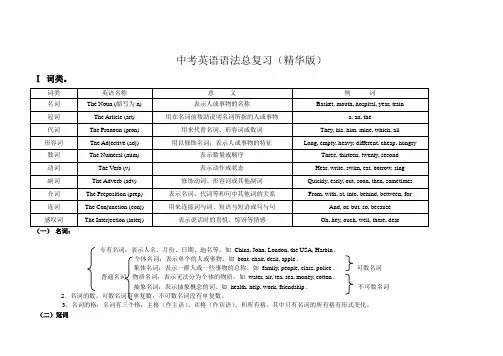
中考英语语法总复习(精华版)Ⅰ词类。
专有名词:表示人名、月份、日期、地名等。
如China, John, London, the USA, Harbin .个体名词:表示单个的人或事物。
如boat, chair, desk, apple .集体名词:表示一群人或一些事物的总称。
如family, people, class, police . 可数名词普通名词物质名词:表示无法分为个体的物质。
如water, air, tea, sea, money, cotton .抽象名词:表示抽象概念的词。
如health, help, work, friendship . 不可数名词 2.名词的数。
可数名词有单复数,不可数名词没有单复数。
3.名词的格:名词有三个格:主格(作主语)、宾格(作宾语)、和所有格。
其中只有名词的所有格有形式变化。
(二)冠词1.定冠词-the .○1特指某(些)人或某(些)事物。
The students are very good.○2说话人与听话人都知道的人或事物。
Where is the toilet ?○3重复提到上文的人或事物。
I have a cat , the cat is white and black .○4表示世界上独一无二的事物。
The moon moves around the earth .○5形容词最高级和序数词前和表示方位的名词前。
I am the oldest . He is the first to school . I live in the south .○6乐器的名称前常用定冠词-the 。
I like playing the piano / violin .○7和某些形容词连用,使形容词名词化,代表某一类人。
We should help the poor .○8放在某些专有名词前。
We will go to visit the Great Wall next week . the people’s Republic of China .○9放在姓氏的复数形式前,表示全家人或夫妇两人。
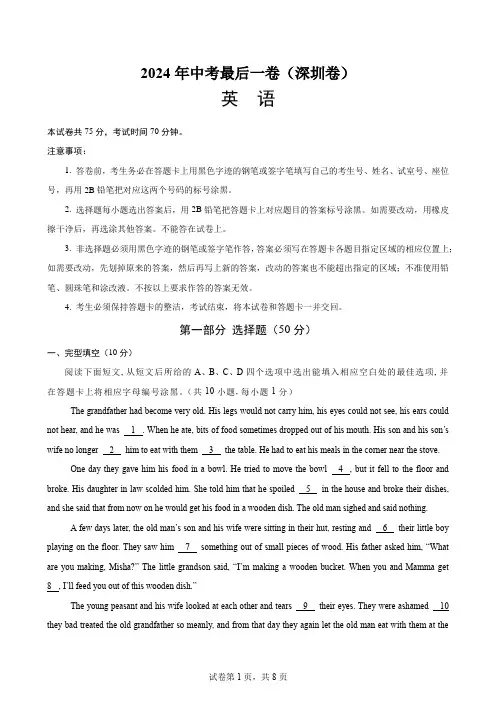
2024年中考最后一卷(深圳卷)英语本试卷共75分,考试时间70分钟。
注意事项:1. 答卷前,考生务必在答题卡上用黑色字迹的钢笔或签字笔填写自己的考生号、姓名、试室号、座位号,再用2B铅笔把对应这两个号码的标号涂黑。
2. 选择题每小题选出答案后,用2B铅笔把答题卡上对应题目的答案标号涂黑。
如需要改动,用橡皮擦干净后,再选涂其他答案。
不能答在试卷上。
3. 非选择题必须用黑色字迹的钢笔或签字笔作答,答案必须写在答题卡各题目指定区域的相应位置上;如需要改动,先划掉原来的答案,然后再写上新的答案,改动的答案也不能超出指定的区域;不准使用铅笔、圆珠笔和涂改液。
不按以上要求作答的答案无效。
4. 考生必须保持答题卡的整洁,考试结束,将本试卷和答题卡一并交回。
第一部分选择题(50分)一、完型填空(10分)阅读下面短文,从短文后所给的A、B、C、D四个选项中选出能填入相应空白处的最佳选项,并在答题卡上将相应字母编号涂黑。
(共10小题,每小题1分)The grandfather had become very old. His legs would not carry him, his eyes could not see, his ears could not hear, and he was 1 . When he ate, bits of food sometimes dropped out of his mouth. His son and his son’s wife no longer 2 him to eat with them 3 the table. He had to eat his meals in the corner near the stove.One day they gave him his food in a bowl. He tried to move the bowl 4 , but it fell to the floor and broke. His daughter-in-law scolded him. She told him that he spoiled 5 in the house and broke their dishes, and she said that from now on he would get his food in a wooden dish. The old man sighed and said nothing.A few days later, the old man’s son and his wife were sitting in their hut, resting and 6 their little boy playing on the floor. They saw him 7 something out of small pieces of wood. His father asked him, “What are you making, Misha?” The little grandson said, “I’m making a wooden bucket. When you and Mamma get 8 , I’ll feed you out of this wooden dish.”The young peasant and his wife looked at each other and tears 9 their eyes. They were ashamed 10 they bad treated the old grandfather so meanly, and from that day they again let the old man eat with them at thetable and took better care of him.1.A.boneless B.toothless C.careless D.breathless2.A.allowed B.asked C.accepted D.advised3.A.on B.in C.at D.off4.A.farthest B.closest C.farther D.closer5.A.nothing B.everything C.anything D.something6.A.noticing B.looking C.seeing D.watching7.A.putting up B.putting together C.putting out D.putting in8.A.old B.weak C.disabled D.useless9.A.formed B.froze C.fixed D.filled10.A.though B.if C.because D.so二、阅读理解(40分)第一节阅读下列短文,从每小题所给的A、B、C、D四个选项中选山最佳选项,并在答题卡上将相应字母编号涂黑。
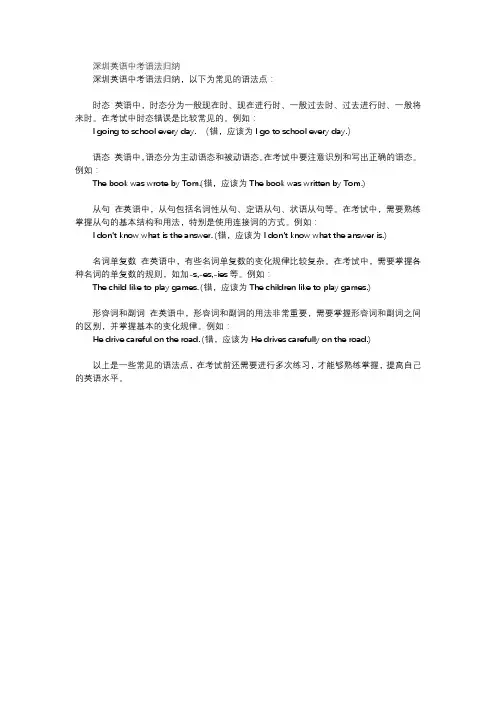
深圳英语中考语法归纳
深圳英语中考语法归纳,以下为常见的语法点:
时态英语中,时态分为一般现在时、现在进行时、一般过去时、过去进行时、一般将来时。
在考试中时态错误是比较常见的。
例如:
I going to school every day. (错,应该为I go to school every day.)
语态英语中,语态分为主动语态和被动语态。
在考试中要注意识别和写出正确的语态。
例如:
The book was wrote by Tom.(错,应该为The book was written by Tom.)
从句在英语中,从句包括名词性从句、定语从句、状语从句等。
在考试中,需要熟练掌握从句的基本结构和用法,特别是使用连接词的方式。
例如:
I don’t know what is the answer. (错,应该为I don’t know what the answer is.)
名词单复数在英语中,有些名词单复数的变化规律比较复杂。
在考试中,需要掌握各种名词的单复数的规则,如加-s,-es,-ies等。
例如:
The child like to play games. (错,应该为The children like to play games.)
形容词和副词在英语中,形容词和副词的用法非常重要,需要掌握形容词和副词之间的区别,并掌握基本的变化规律。
例如:
He drive careful on the road. (错,应该为He drives carefully on the road.)
以上是一些常见的语法点,在考试前还需要进行多次练习,才能够熟练掌握,提高自己的英语水平。
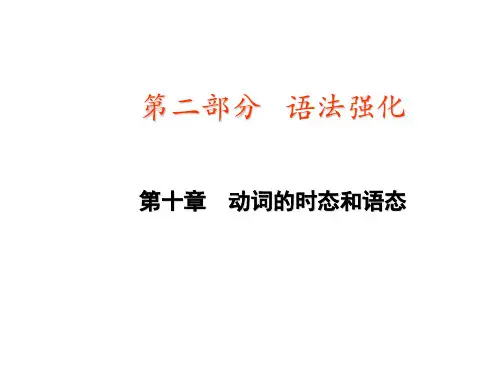
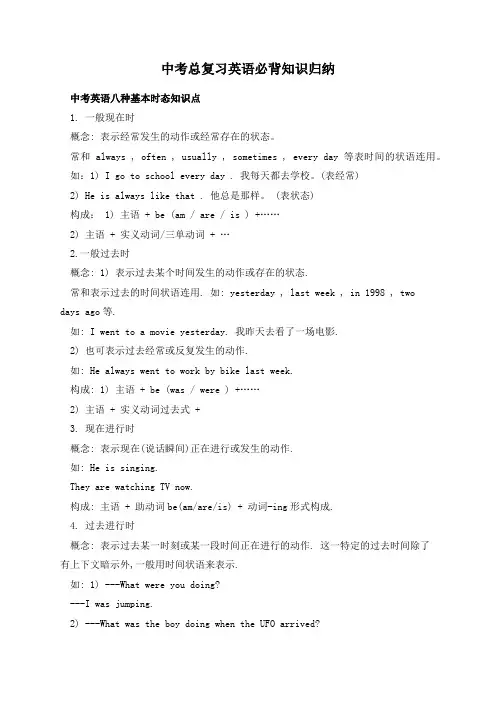
中考总复习英语必背知识归纳中考英语八种基本时态知识点1. 一般现在时概念: 表示经常发生的动作或经常存在的状态。
常和 always , often , usually , sometimes , every day 等表时间的状语连用。
如:1) I go to school every day . 我每天都去学校。
(表经常)2) He is always like that . 他总是那样。
(表状态)构成: 1) 主语+ be (am / are / is ) +……2) 主语 + 实义动词/三单动词+ …2.一般过去时概念: 1) 表示过去某个时间发生的动作或存在的状态.常和表示过去的时间状语连用. 如: yesterday , last week , in 1998 , twodays ago等.如: I went to a movie yesterday. 我昨天去看了一场电影.2) 也可表示过去经常或反复发生的动作.如: He always went to work by bike last week.构成: 1) 主语+ be (was / were ) +……2) 主语 + 实义动词过去式 +3. 现在进行时概念: 表示现在(说话瞬间)正在进行或发生的动作.如: He is singing.They are watching TV now.构成: 主语 + 助动词be(am/are/is) + 动词-ing形式构成.4. 过去进行时概念: 表示过去某一时刻或某一段时间正在进行的动作. 这一特定的过去时间除了有上下文暗示外,一般用时间状语来表示.如: 1) ---What were you doing?---I was jumping.2) ---What was the boy doing when the UFO arrived?---He was sleeping.构成: 主语 + 助动词be(was/were) + 动词-ing形式构成.5. 一般将来时概念: 表示将来某个时间要发生的动作或存在的状态,也表示将来经常或反复发生的动作,常与表示将来的时间状语连用,如: tomorrow, next week, next year, in the future等.如: He will go shopping tomorrow.They are going to play basketball next week.构成: 1) 主语 + 助动词will + 动原+…2) 主语 + be going to + 动原+ ….6. 过去将来时概念: 表示在过去将来的某一时间发生的动作或存在的状态.构成: 1) 主语(第一人称) + 助动词should + 动原+…2) 主语 + would + 动原+ ….3) 主语 + was/ were going to +动原…用法: 过去将来时除了上下文暗示外,一般常用在间接引语中,主句谓语动词为过去时态.如: 1) I should go.2) You knew I would come.3) They were going to Naning.7. 现在完成时构成: 主语 + 助动词 ( have / has ) + 动词过去分词+…用法例句表示过去发生或已经完成的动作对现在造成的影响或结果. ---Have you had your lunch yet?---Yes, I have. (现在我不饿了)8. 过去完成时构成: 主语 + 助动词 had + 动词过去分词+…用法例句表示过去在过去某一时间或动作之前已经发生或完成了的动作.它表示的动作发生的时间是”过去的过去”.表示过去某一时间可用by, before 等构成的短语,也可用when, before, 等引导的从句或者通过上下文表示.I had finished my homework when my mom came back home.中考英语宾语从句知识点宾语从句是指在一个句子中充当宾语的句子,如:He said that he wanted to be a teacher when he grew up.宾语从句的特点:①宾语从句有自己的连接词②宾语从句用陈述语序③宾语从句的时态(1)宾语从句的连接词:宾语从句的连接词包括that、if/whether(是否)、特殊疑问词。
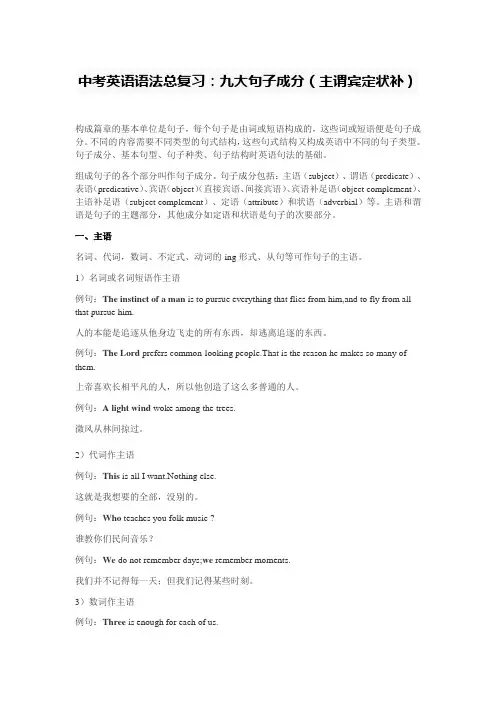
中考英语语法总复习:九大句子成分(主谓宾定状补)构成篇章的基本单位是句子,每个句子是由词或短语构成的,这些词或短语便是句子成分。
不同的内容需要不同类型的句式结构,这些句式结构又构成英语中不同的句子类型。
句子成分、基本句型、句子种类、句子结构时英语句法的基础。
组成句子的各个部分叫作句子成分。
句子成分包括:主语(subject)、谓语(predicate)、表语(predicative)、宾语(object)(直接宾语、间接宾语)、宾语补足语(object complement)、主语补足语(subject complement)、定语(attribute)和状语(adverbial)等。
主语和谓语是句子的主题部分,其他成分如定语和状语是句子的次要部分。
一、主语名词、代词,数词、不定式、动词的-ing形式、从句等可作句子的主语。
1)名词或名词短语作主语例句:The instinct of a man is to pursue everything that flies from him,and to fly from all that pursue him.人的本能是追逐从他身边飞走的所有东西,却逃离追逐的东西。
例句:The Lord prefers common-looking people.That is the reason he makes so many of them.上帝喜欢长相平凡的人,所以他创造了这么多普通的人。
例句:A light wind woke among the trees.微风从林间掠过。
2)代词作主语例句:This is all I want.Nothing else.这就是我想要的全部,没别的。
例句:Who teaches you folk music ?谁教你们民间音乐?例句:We do not remember days;we remember moments.我们并不记得每一天;但我们记得某些时刻。
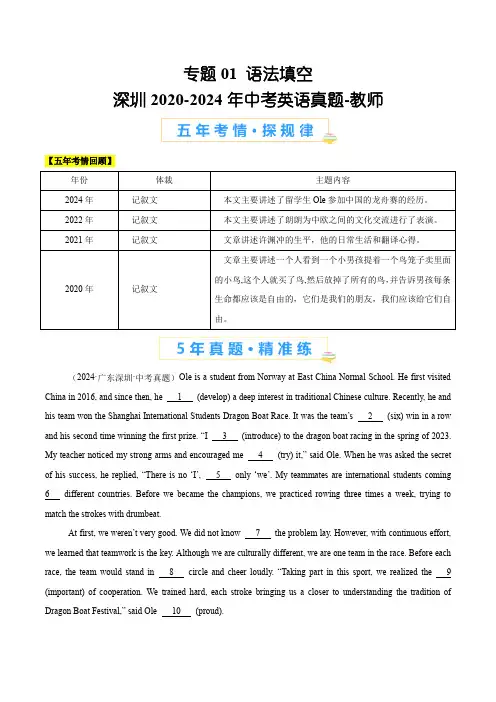
专题01 语法填空深圳2020-2024年中考英语真题-教师(2024·广东深圳·中考真题)Ole is a student from Norway at East China Normal School. He first visited China in 2016, and since then, he 1 (develop) a deep interest in traditional Chinese culture. Recently, he and his team won the Shanghai International Students Dragon Boat Race. It was the team’s 2 (six) win in a row and his second time winning the first prize. “I 3 (introduce) to the dragon boat racing in the spring of 2023. My teacher noticed my strong arms and encouraged me 4(try) it,” said Ole. When he was asked the secret of his success, he replied, “There is no ‘I’, 5 only ‘we’. My teammates are international students coming 6 different countries. Before we became the champions, we practiced rowing three times a week, trying to match the strokes with drumbeat.At first, we weren’t very good. We did not know 7 the problem lay. However, with continuous effort, we learned that teamwork is the key. Although we are culturally different, we are one team in the race. Before each race, the team would stand in 8 circle and cheer loudly. “Taking part in this sport, we realized the 9 (important) of cooperation. We trained hard, each stroke bringing us a closer to understanding the tradition of Dragon Boat Festival,” said Ole 10 (proud).【答案】1.has developed 2.sixth 3.was introduced 4.to try 5.but 6.from 7.where 8.a 9.importance 10.proudly【导语】本文主要讲述了留学生Ole参加中国的龙舟赛的经历。
年级初一学科英语版本上海牛津版课程标题语法总结:MⅠ& MⅡ编稿老师戴丹丹一校林卉二校黄楠审核张丽丽一、学习目标复习总结:1. Wh-question的用法;2. 一般现在时,频度副词和频度副词式短语;3. 可数名词和不可数名词;4. there be句型;5. 形容词的用法。
二、重点、难点1. Wh-question的用法;2. 一般现在时,频度副词和频度副词式短语。
三、考情分析在中考说明中,本课的考试要求如下:第9条:理解并能区别所学的可数名词和不可数名词。
第10条:熟练掌握所学可数名词复数形式的构成及用法。
第30条:熟练掌握形容词作定语、表语及宾语补足语的用法。
第40条:熟练掌握一般现在时的构成和基本用法。
第52条:掌握五个简单句和there be 句型的基本用法。
第54条:理解一般疑问句、特殊疑问句和选择疑问句的构成和基本用法。
1. 【教材原句】What is her name?【概念】Wh-question的构成及用法。
【用法】特殊疑问句是用来对句子某一部分提问的疑问句。
疑问词出现在句首,后接不完整的一般疑问句。
句末通常用降调来读。
1. what ―什么‖(对―事,物‖提问;对职业提问。
)2. who ―谁‖(对―人‖提问。
)3. which ―哪个‖(既可以对―人‖提问,也可以对―物‖提问。
)4. whose ―谁的‖(对物主提问。
)5. when ―什么时候‖(对时间提问。
)6. why ―为什么‖(对原因提问。
)7. where ―在哪里‖(对地点提问。
)8. how ―怎样‖(对方式,程度,状态等提问。
)9. how many ―多少‖(对可数名词的复数提问。
)10. how much ―多少‖(对不可数名词提问,对价格提问。
)11. how long ―多长‖(对时间段或物体的长度提问。
)12. how soon ―多久‖(对―in+时间段‖提问。
)13. how often ―多久一次‖(对频率提问。
第二篇句法三、常见习惯用语(一)知识概要由于英语国家的语言习惯与中国的语言习惯有许多不同之处,所以造成了许多同学在做选择或书写,或与人交谈中造成误用中国方式来对英语的问句作解答。
例如一个小女孩十分好看,可爱,外国人见到时会讲:You are so beautiful 这时的答语应该是 Thank you 如果外国人发现你的英语不错,他们会讲: Your English is very good 这时中国人常常会说:不,我说的不好。
这纯是一种礼貌的答语,但是不符合英语习惯。
它正确的答语应是 Thank you 虽然交际英语有一些规律可讲,但更重要的是学习外国的生活习惯,了解他们的文化背景,历史渊源,这样才能真正的学好一门外语。
(二)正误辨析[误] - What can I do for you?- Yes, please help me[正] - What can I do for you?- I'd like to buy a sweater[析] What can I do for you? 这一问语实际上用于的情景很多,要根据具体情况而定。
如在商店中售货员讲这句话应译为:您想要点什么?在其他场合也可以被译为:我能为您做些什么?它的答语应是直接讲出想让对方提供的帮助。
[误] - Which colour do you like?- Sorry, I don't like[正] - Which colour do you like?- I prefer blue[析]由 which 来提问的问句是要回答具体的选择,而不能泛指,泛泛的回答。
如 Yes, I like it[误] Do you like to come with us tonight?[正] Would you like to come with us tonight?[析] Do you like …问的是对方的习惯,如: Do you like swimming? Do you like collecting stamps? 而 would you like …则是一次性的邀请、提议。
广东省深圳市中考英语:听说考试的答题技巧和注意事项广东省深圳市中考英语:听说考试的答题技巧和注意事项一、文章类型本文将为广东省深圳市中考英语听说考试的答题技巧和注意事项提供详细的解读。
文章类型为记叙文,旨在帮助考生更好地应对中考英语听说考试。
二、梳理思路在开始本文之前,我们先对深圳市中考英语听说考试的考试内容进行简单介绍,以便更好地理解答题技巧和注意事项。
深圳市中考英语听说考试主要包括听力和口语两个部分,涉及选择题、填空题、完形填空题、短文改错等多种题型。
接下来,我们将分别从答题技巧和注意事项两个方面进行详细阐述。
三、列举关键点1、答题技巧 (1) 注意听力部分的语言规则,如发音、语调和连读等。
在听力开始前,考生应先熟悉题干和选项,预判可能的答案。
(2) 灵活运用填空题的答题方法,如根据上下文推断答案、利用语法知识判断空格处应填入的词性或时态等。
(3) 完形填空题考查考生的整体理解能力和词汇运用能力。
考生在解题时应结合文章大意,注意上下文之间的逻辑关系。
(4) 短文改错题要求考生具备较高的语言敏感度和纠错能力。
在解题时,考生应关注语法、词汇、拼写等易出错的地方,提高识别错误的能力。
2、注意事项 (1) 考生在考试前应充分准备,包括熟悉题型、了解考试要求、合理安排时间等。
(2) 听力部分要注意音量调节和记录关键信息,避免因设备问题或记录失误影响成绩。
(3) 口语部分要求考生表达清晰、流畅,并注意语音语调和语法规范。
在回答问题时,考生应尽量用简洁明了的语言表述。
(4) 考试结束后,考生应立即停止答题,检查无误后等待监考老师收卷。
四、举一反三本文所列举的答题技巧和注意事项不仅适用于深圳市中考英语听说考试,还适用于其他地区的中考英语听说考试。
希望考生们在掌握这些技巧和注意事项的同时,能够结合自身实际情况,不断调整和优化答题策略,提高英语听说能力。
为了更好地应对中考英语听说考试,建议考生们做到以下几点:1、平时多进行听说训练,提高自己的英语听说水平。
深圳英语中考常用词组和固定搭配1 (see 、hear 、notice 、find 、feel 、listen to 、 look at (感官动词)+do eg:I like watching monkeys jump2 (比较级 and 比较级) 表示越来越怎么样3 a piece of cake =easy 小菜一碟(容易)4 agree with sb 赞成某人5 all kinds of 各种各样 a kind of 一样6 all over the world = the whole world 整个世界7 along with同……一道,伴随…… eg : I will go along with you我将和你一起去the students planted trees along with their teachers 学生同老师们一起种树8 As soon as 一怎么样就怎么样9 as you can see 你是知道的10 ask for ……求助向…要…(直接接想要的东西) eg : ask you for my book11 ask sb for sth 向某人什么12 ask sb to do sth 询问某人某事 ask sb not to do 叫某人不要做某事13 at the age of 在……岁时 eg:I am sixteen I am at the age of sixteen14 at the beginning of …… ……的起初;……的开始15 at the end of +地点/+时间最后;尽头;末尾 eg : At the end of the day16 at this time of year 在每年的这个时候17 be /feel confident of sth /that clause +从句感觉/对什么有信心,自信eg : I am / feel confident of my spoken English I feel that I can pass the test18 be + doing 表:1 现在进行时 2 将来时19 be able to (+ v 原) = can (+ v 原) 能够…… eg : She is able to sing She can sing20 be able to do sth 能够干什么 eg :she is able to sing21 be afraid to do (of sth 恐惧,害怕…… eg : I'm afraed to go out at night I'm afraid of dog22 be allowed to do 被允许做什么eg: I'm allowed to watch TV 我被允许看电视 I should be allowed to watch TV 我应该被允许看电视23 be angry with sb 生某人的气 eg : Don't be angry with me24 be angry with(at) sb for doing sth 为什么而生某人的气25 be as…原级…as 和什么一样 eg : She is as tall as me 她和我一样高26 be ashamed to27 be away from 远离28 be away from 从……离开29 be bad for 对什么有害 eg : Reading books in the sun is bad for your eyes 在太阳下看书对你的眼睛不好30 be born 出生于31 be busy doing sth 忙于做什么事 be busy with sth 忙于……32 be careful 当心;小心33 be different from…… 和什么不一样34 be famous for 以……著名35 be friendly to sb 对某人友好36 be from = come from 来自 eg :He is from Bejing He comes from Bejing Is he from Bejing ? Does he come from Bejing ?37 be full of 装满……的 be filled with 充满 eg: the glass is full of water the glass is filled with water38 be glad+to+do/从句39 be going to + v(原) 将来时40 be good at(+doing) = do well in 在某方面善长,善于……41 be good for 对什么有好处 eg : Reading aloud is good for your English42 be happy to do 很高兴做某事43 be helpful to sb 对某人有好处eg : Reading aloud is helpful to you 大声朗读对你有好处Exercising is helpful to your bady 锻炼对你的身体有好处44 be in good health 身体健康45 be in trouble 处于困难中 eg : She is in trouble They are in tronble46 be interested in 对某方面感兴趣47 be late for = come late to 迟到 eg: Be late for class 上课迟到48 be like 像…… e g : I'm like my mother49 be mad at 生某人的气50 be made from 由……制成(制成以后看不见原材料)51 be made of 由……制成(制成以后还看得见原材料)52 be not sure 表不确定53 be on a visit to 参观54 be popular with sb 受某人欢迎55 be quiet 安静56 be short for 表**的缩写 eg: 陶 is short for 陶俊杰57 be sick in bed 生病在床58 be sorry to do sth be sorry for sb eg : I am sorry for you59 be sorry to hear that60 be sorry to trouble sb eg : I am sorry to trouble you61 be strict in doing sth 严于做某事 eg : He's strict in obeying noles62 be strict with sb 对某人要求严格 eg: Some students are not strict with them selves 这些学生对自己不严格63 be strict with sb in sth 某方面对某人严格64 be supposed to do 被要求干什么65 be sure 表确定66 be sure of doing sth 对做某事有信心 eg: He is sure of winning I am sure of learning English well67 be sure of sth 对做某事有信心 eg: I'm sure of my head (my teacher 我相信我的大脑(老师)68 be sure that sth 对做某事有信心 eg: I'm suer that he can pass the test 我相信他能通过考试69 be sure to do sth一定会做某事eg: We are sure to pass the test 我们一定会通过这次考试 We are sure to learn English well 我们一定能学好英语70 be terrified of + 名/动doing 害怕……71 be terrified to do sth 害怕做某事72 be the same as … 和什么一样73 be used to doing sth 习惯做某事eg: My father is used to getting up early 我爸爸习惯早He is used to sleeping in class 他习惯上课睡觉74 be worth doing 值得做什么75 be(feel) afraid to do sth 害怕做某事be afraid of sth 害怕某物 be afraid that 丛句76 because+句子 because of +短语eg : He was late because he had a headache He was late because of his headache77 begin to do = start to do 开始做某事start…with…=begin…with… 以什么开始什么eg : Let's begin the game with the song I begin to go home78 between…and… 两者之间79 borrow sth from sb 向……借…… lend sth to sb ( lend sb sth 借给……什么东西eg : I borrowed a pen from him he lent a pen to me ( he lent me a pen80 both = the same(as) = not different(from) 表相同81 bother 打扰 bother sb to do stheg : I'm sorry to bother you ,but can you tell me to way to the station 我十分道歉打扰你,但是你能告诉我怎么去车站the problem has been bothering me for weeks 这个问题困扰了我几个周了He's bothering me to lend him money82 by the end of 到……为止83 call sb sth eg : We call him old wang84 care 关心 eg : Don't you care about this country's future ?你为什么不关心国家的未来85 catch up with sb 赶上某人86 chat with sb 和某人闲谈 take sb to + 地点带某人去某地87 come in 进88 come over to 过来89 come up with 提出 eg: Can you come up with a good idea 你能想出一个好办法吗?90 communicate with sb 和某人交流91 consider + doing 考虑做什么 eg : Why not consider going to lu zhou 为什么不考虑去泸州?92 dance to 随着……跳舞 eg : She likes dancing to the music 她喜欢随着音乐跳舞93 decide to do sth 决定做某事94 do a survey of 做某方面的调查95 do better in 在……方面做得更好96 do wrong 做错97 Don't forget to do sth 不要忘了做某事98 Don't mind +doing /从句 /名词不要介意……99 each +名(单)每一个…eg : Each student has many books 每一个学生都有一些书100 end up +doing 101 enjoy +doing喜欢101 wait for sb 等某人102 escape from 从……逃跑eg: The prisoners have escaped from the prison 犯人从监狱里逃跑出来103 expect to do sth 期待做某事104 fall down 摔下来 fall off 从哪摔下来105 fall in love with sb /sth 爱上什么106 far from 离某地远 eg : The school is far from my home107 find +it +adj +to do 发现做某事怎么样108 find sb/sth +adj 发现什么怎么样 eg : I find the book interesting 109 finish 完成+doing(名词)110 fit to sb = be fit for sb 适合某人111 forget to do 没有做而忘了 forget doing 做了而又忘了 eg: Don't forget to go home I forget closing door112 from…to… 从某某到某某 eg: From me for her113 get /have sth down 做完,被(别人)做…eg: I have my hair cut 我理了发(头发被剪了)Tom got his bad tooth pulled out 汤母把他的坏牙拔掉了(被牙医拔掉了) 114 get a part-time job= find a part-time job 115 get along well with sb = get on well with sb 与某人相处得好116 get along with sb = get on with sb 与某人相处117 get ready for = be ready for为什么而准备eg : I get ready for math I am ready for math 118 get sb in to trouble 给某人麻119 get sb to do sth120 get…from… 从某处得到某物121 give a talk 做报告 eg: He is give a tall122 give sth to sb give sb sth 给某人某物123 go fish 钓鱼 go swimming 游泳124 go on to do 去做下一件事 go on doing 继续做这件事125 go out away from go out of126 go to school 上学(用于专业的)go to the school 去学校(不一定是上学) 127 good way to 好方法128 hate to do 讨厌没做过的事 hate doing 讨厌做过的事129 have a party for sb 举办谁的晚会130 have a talk 听报告谈一谈131 have been doing 现在完成进行时 eg : You have been talking You have been sleeping since132 have been to …( 地方)……去过某过地方 have gone to …(地方) 去了某地还没回来133 have fun +doing 玩得高兴134 have sth to do 有什么事要做eg: I have a lot of homework to do 我有很多家庭作业要做 I have nothing to do 我没什么事情做135 have to do sth 必须做某事136 have trouble (problem) (in) doing sth 做什么事情有麻烦137 have…time +doing138 have…(时间)…off 放……假 eg: I have month off 我请一个月得假139 hear sb +do/doing 听见某人做某事/正在做某事140 help a lot 很大用处141 help sb with sth one's sth 帮助某人某事(某方面) help sb (to) do sth 帮助某人做某事142 hope to do sth 希望做某事143 How about(+doing) = What about(+doing)144 how do you like = what do you think of 你对什么的看法145 if : 是否=wethereg: I don't know if (wether) I should go to the party 我不知道我是否应该去参加晚会He don't know if (wether) we will arrive on time tomorrow morning 他不知道我们明天早上是否能准时到达146 if :如果,假如(全部接一般时态)+条件语态从句eg: I'll go to LuZhou if it does't rain 假如明天不下雨,我就去泸州If they change the plan they will let me know 假如他们要改变计划,他们会让我知道的I'll go to England ,if I have enough money next year 如果我明年由足够的钱,我就要去英国147 in one's opinion = sb think 某人认为148 in some ways 在某些方面149 in the end = finally(adv) 最后150 in the north of… 什么在什么的北方 (north 北 sowth 南 west 西 east 东 )151 in the sun 在太阳下152 increase 增加eg : They've increased the prece of petrol by 3% 他们把石油价增加了3%the population has increased from 12 million ten years ago to 18 million now153 instead of +(名 ) 代替eg: I'd like an apple instead of a pear 我想要苹果,而不要梨子I like English instead of math 我喜欢英语而不喜欢数学154 introduce sb to sb 介绍某人给某人 introduce oneself 自我介绍155 invite sb to do sth 邀请某人做某事156 It takes sb sometime to do sth 做某人花掉某人多少时间eg : It took me 5 minutes to do my homework It takes me half an hour to cook157 It's +adj +for sb to do sth 对某人来说做某事怎么样158 It's +adj +to do 做某事怎么样159 It's +adj for sb 对于某人来说怎么样 It's +adj of sb 对某人来说太怎么样160 It's +adj(for sb) to do(对某人来说) 做某事怎么样 It's +adj of sb to do sth 对某人来说做某事太怎么样eg : It's nice of you to help me with my English161 It's a good idea for sb to do sth 对…… 来说是个好主意162 It's important to sb 对某人来说很重要 eg: It's important to me 163 It's time to do sth It's time for sth 到了该去做某事的时间eg : It's time to have class It's time for class 该去上课了164 join = take part in 参加165 just now 刚才166 keep +sb /sth +adj /介词短语让什么保持什么样?167 keep out 不让…… 进入168 keep sb adj 让……保持…… eg: I wa nt to keep my mother happy keep healthy 保持健康169 key to +名词表示:某物的钥匙或某题的答案170 key to… anser to … key 可以是答题或钥匙171 laugh at… 取笑…… eg : Don't langh at others We langhed at the joke 172 learn by oneslfe 自学173 learn from sb 向某人学习 eg: We should learn from Lei Feng174 learn to do sth 学做某事175 let sb do sth 让某人做某事176 Let sb down 让某人失望 eg : We shouldn't let our farents down 我们不应该让我们的父母失望177 live from :离某地远178 live in +大地方 /at +小地方居住在某地 eg: I live in LuZhou She lives at XuanTan179 look after = take care of 照顾照看180 lose one's way 谁迷路 eg : Lose your way 你迷路181 make a decision to do sth 决定做某事182 make friends with sb 和谁成为朋友 eg : I want to make friends with you183 make it early 把时间定的早一点184 make on exhibition of oneself 让某人出洋相185 make sb /n +n 使什么成为什么 eg : I made her my step moller I made you my wife186 make sb /sth +adj 使某人(某物)怎么样 eg : You must made your bed clean187 make sb /sth adj 使某人/某物怎么样188 make sb do sth 让某人做某事 eg : I made him write 我以前让他写189 make up be made up of (被动语态)由……组成190 make…difference to…191 mind sb to do mind one's doing 介意……做什么192 most +名 most of +代193 much too +形容词194 must be 一定195 need +名词196 need sb do sth 需要某人做某事197 need to do (实义动词) need do (情态动词)198 no /neithr of hate to do no /neithr of hate doing199 no +名词200 not anymore = no more 再也不…… eg: He didn't cry any more He cried no more 他再也不哭201 not… (形、副)at all eg: He's not tall at all she doesn't junp far at all201 try…试衣服 have a try 试一下202 not…at all 一点都不203 not…either 表否定,也不 eg : I don't japanse either I don't have sister, either 我也没有姐姐204 not…until 直到……才……eg: I didn't sleep until my mother came back The child didn't stop crying until I give her sugar205 offer / provide sb with sth 给某人提供206 offer sb sth ( offer sth to sb 提供什么东西给某人 eg : I offer you water (I offer water to you 我给你提供水207 on one's way to… 在谁去那的路上208 on the one hand 一方面 on the other hand 另一方面209 on the phone = over the phone 用电话交谈210 on time 准时 in time 及时211 one day =some day =someday 一天,有一天212 one of +可数名词的复数形式213 one to another 一个到另一个214 over and over agin 一遍又一遍的 eg : He cleaned the floor over and over agin215 part-time job 兼职工作 fall-time job 全职工作216 pay for… 付……钱 pay the bill 开钱,付钱217 please +do218 please help yourself219 pleased with sb220 pool into = pore into221 practice +doing 练习做某事222 prefer sth to sth 相对……更喜欢…… eg : I prefer physics to chemisty 在物理和化学中,我更喜欢物理prefer doing to sth 更喜欢去做…不愿意去做… eg: He p refers riding a bike to diving 他更喜欢骑自行车,不开小车prefer to do sth rather than do sth 宁愿做…也不愿eg: My unde prefers to buy a now car rather than repaiv the used one 我叔叔更喜欢买新的车,也不去修旧车prefer sb not to do sth 更愿意… eg: I prefer her not to come 我不喜欢她不来223 pretend to do sth 装着去做什么 pretend that 从句eg : The two cheats pretended to be working very hard 这两个骗子装着努力工作He pretended that he did not know the answer 他装着不知道答案224 rather…than 宁可……也不……eg : I would rather be a doctor than a teacher 我愿肯当医生,也不当老师He likes dogs rather than cats 他喜欢狗,不喜欢猫225 regard…as 把……当作……eg: Please give my best regards to your family 请带我向你的家人我最好的问候I regard you as my friend 我把你当作我的朋友He shows little regard for others 他不爱关心别人226 remid sb about sth 提醒某人什么事 remid sb to do sth 提醒某人做某事eg : he remids me about cooking (he remids me to cook 他提醒我做饭227 remid sb of sth 使某人想起什么eg : the pictures remind me of my school days 这照片使我想起了我的学校the words that (which) the teacher talke to remind me of my mother 228 return sth to sb 还什么东西给某人229 say to oneself 对自己说230 say to sb 对某人说231 sb spend somemoney on sth 花了多少钱在某事上232 sb spend sometime with sb 花了多少时间陪谁233 sb spend sometime(in) doing sth 花了多少时间做某事234 sb with sb +is sb and sb +are235 see sb do 看见某人做过某事 see sb doing 看见某人正在做某事236 seem to do/be +adj 显得怎么样 eg : You seem to be tired You seem to be happy237 send +sb sth 送给某人某物238 send…to…把什么寄到哪里去?239 shock 使……震惊 eg : Oh , It's only you ! You give me a shock 啊,是你呀!吓我一跳240 show sb sth 向某人展示某物 eg : I show her the book。
一、主要句式(一) 知识概要分为以下五种:①主语+不及物动词。
如:I arrived at six last night.②主语+及物动词+宾语,如:I bought a good English Chinese Dictionary yesterday.③主语+及物动词+间接宾语+直接宾语,如:Please tell me a story before I go to bed. 这样可加双宾语的句子有buy,tell, give, ask, pass, teach.④主语+及物动词+宾语+宾语补足语,如:I found it impossible to do it. Please keep the classroom clean and tidy.⑤主语+系动词+表语,如:Tom is an American boy. The grass turned green in spring.在初中常见的句型中有There be…句型,表示存在某种事物,如:There is a map on the wall be动词的形式要与其后面相近的那个名词相一致。
要注意的是这种句型加入助动词后,也要保持be动词,不要换用have,如:There is going to be a meeting tomorrow.即句子的主语与谓语动词要相呼应。
要注意的有如下几点:①用and连接两个主语时一般应视为复数,但如一人身兼两职时则要用单数谓语动词形式,如:A singer and dancer is coming to our party. a singer and dancer 既歌唱又可舞的演员。
而 a singer and a dancer 则要译为:一位歌唱家和一位舞蹈家。
②有些以s 结尾的名词谓语动词要用单数,如:The news is good (news 为不可数名词)。
③有量词时应按量词的数量计算;如:This pair of glasses is good My glasses are broken. ④有些形单却意为复数的名词,如:People are coming here这样的词还有Police,如果要讲一个警察时,应讲 a policeman。
两个警察为two policemen。
又如 a policewoman, two policewomen⑤所有不定代词each,either,neither,one,the other,nobody,nothing,anyone,anything,someone,something …要作为单数如:Someone is waiting for you and not only …but also,neither …nor,either …or如: My sister and my parents are going to the cinema。
表示转折关系的并列连词有:but 和yet,如:She is a good student, but she didn't pass the final exam. 又如:I think the news is strange, yet it is true表示选择关系的连词有:or,either …or,如:Hurry up, or you will be late forschool表示因果关系的并列连词有:for,so 如:They studied very hard,so they all passed the exam在初中范围复合句中主要有状语从句和宾语从句(名词性从句)两种,而定语从句(形容词性从句)要在高中讲述,为了使同学阅读文章方便,我们将在下面另一章予以介绍。
我们首先来看宾语从句。
①在及物动词的后面可以接一个名词来充当宾语,如:I knew the man, 而这时也可以用一个句子来充当宾语,如:I knew that he was a good man这时宾语从句的连接词有that, (that 只在从句中起联接作用,不在句中充当语法成分,既不是主语也不是宾语,所以在口语中常常被省略。
如:I am sure (that) she has passed the exam②if, whether 它们在宾语从句中只起连接作用,不起语法作用,当作是否讲。
从句中有or not 结构时,要用whether, 如:I ask him if (whether)he has had his lunch I asks him whether he has had his lunch or not③what 它在宾语从句中除了作连接词外,还要作主语或宾语成份,如:I don't understand what you said(what 作said 的宾语)。
又如:I asked him what made him sick (what 在宾语从句中作主语)。
④who,它也和what一样,在句中除作连接词外,可以充当句中的成份,如:I know who she is looking for? ⑤whose 如:I want to know whose book this is? ⑥which 如:Do you know which book is mine?4个常用的连接副词,①how 它的应用最广,如:how much, how many, how long, how soon, how old …。
如:How much does it cost? ②when 它只是连接时间状语,如:Please tell me when the meeting will begin? ③where 它连接地点状语,如:Where are you from? ④why 它要连接的是原因状语从句,如:The teacher asked why Tom didn't come to school.语从句的时态与主句时态的呼应问题。
①主句谓语动词如果是现在时或将来时,宾语从句的时态可以是任何所需要的时态,如:I know he didn't come. 我知道他没来。
I know he will come tomorrow我知道他明天来。
I know he has gone to London我知道他已去伦敦了。
②主句中的谓语动词若是过去时,宾语从句也要用过去时态中的某一种。
比如:一般过去时,过去进行时,过去将来时,过去完成时。
除了在表达宇宙中的客观真理时,不能用现在时态。
如:I wanted to know when he would come The teacher told me the earth moves around the sun after,before,when,as,as soon as,until (till),while,since,by until (till) 直到,在用until 表达时间状语的句子中,主句中的动词是要十分小心去选择。
如动词是持续性动词,它要用肯定句,如:I studied hard until 12 o'clock last night. 如果动词是瞬间截止性动词,则要用否定句,如:He didn't go to bed until his mother came back since,for,by,before 来引导的时间状语从句。
since 引导的时间状语是动作的开始时间,如:I have studied English since 而由by 引导的时间状语通常是动作的结束时间,如:I had learned 25 English songs by the end of last term而before 则多用于完成时,ago 则多用于一般过去时,如:He had finished his work before twelve yesterday I left my hometown two years ago③在状语从句中用一般现在时或一般过去时表示将来。
它们可能是主句用一般将来时,从句用一般现在时,如:If it rains, they won't go to the park on Sunday也可以主句是一般过去时,从句用一般过去进行时,如:He said if it rained the next day he would not go to the park考试中常见的考点有:要学生区别是条件、时间状语从句还是宾语从句,因在宾语从句中该用什么时态用什么时态,如:I want to know if he will come here tomorrow在宾语从句中的条件状语从句与主句的关系,如:I want to know if it rains he will come here tomorrow because,应译为"因为"。
它表达的因果关系最强,如:He didn't pass the exam because he didn't study hard②since 应译为"既然",如:Since you were ill yesterday I left some notes on your desk③as 应译为"由于",如:As it is too hot we'd better go swimming since 与as 所表达的因果关系远比because 弱得多。
而for 表达的因果关系最弱。
它不能用于句首,如:He studies hard, for he wants to go to college中有同级比较as …as,如:This book is as good as that one要注意的有两点:①as …as 中间要用原级而不是比较级。
②用形容词还是副词,如:Mary writes as carefully as Tom而其否定句为not as (so) …as,如:They didn't work so hard as we did, 而不同级比较用比较级加than, 如:He is younger than I am要注意的是表示"越来越"这一概念时有两个句型:①比较级+and+比较级,如:The days are getting longer and longer The little girl is becoming more and more beautiful②定冠词the +比较级+the +比较级,如:The harder you study, the more you can learn意的是as (连词)与like (介词)的区别。